- Benedict's Creative Minority - Dr. Samuel Gregg of the Acton Institute, on the Benedict’s vision of the Catholic Church’s role in contemporary Europe (September 22, 2010):
In the wake of Benedict XVI’s recent trip to Britain, we have witnessed—yet again—most journalists’ inability to read this pontificate accurately. Whether it was Queen Elizabeth’s gracious welcoming address, Prime Minister David Cameron’s sensible reflections, or the tens of thousands of happy faces of all ages and colors who came to see Benedict in Scotland and England (utterly dwarfing the rather strange collection of angry Kafkaesque protestors), all these facts quickly disproved the usual suspects’ predictions of low-turnouts and massive anti-pope demonstrations.
Indeed, off-stage voices from Britain’s increasingly not-so-cultured elites—such as the celebrity atheist Richard Dawkins and others whom the English historian Michael Burleigh recently described as “sundry chasers of limelight” and products of a “self-satisfied provincialism”—were relegated to the sidelines. As David Cameron said, Benedict “challenged the whole country to sit up and think.” ...
- Blessed by Blessed John Henry Newman National Catholic Register September 22, 2010. Legionary Father Thomas Williams is a Michigan-born professor of theology and ethics at Regina Apostolorum University in Rome. He was in England to witness the papal visit there and beatification of Cardinal John Henry Newman. He reflects on the visit, some of the controversy surrounding it, Blessed John Henry Newman and the priesthood.
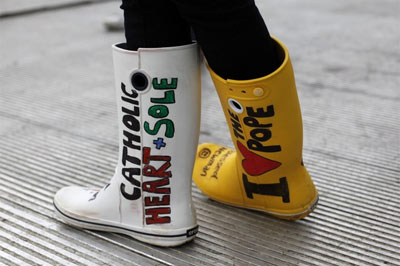
- Celebrating the Papal Visit online: My pilgrim social media journey (Claz Coms) - Claz Gomez, papal pilgrim and blogger, shares her experience of the Pope's visit as accounted through Twitter, Youtube and her blog.
- "Mainstream US media asleep on the job?" asks the Pertinacious Papist (September 24, 2010):
A friend of mine, a retired Hollywood actor, who rightfully prides himself on keeping up with the news, wrote me recently and included a newspaper clipping on the Pope's recent trip to Great Britain. The newspaper article featured a large photo of crowds of placard-bearing anti-Catholic demonstrators and was substantially devoted to only one subject: the Pope's meeting with sex-abuse victims and the outrage of Britons over the sex scandal. If one's news sources were limited to the mainstream print media and TV networks in the US, this is likely all he would know about the Pope's journey to Britain, if he knew about it at all.
Likewise, Deacon Greg Kandra notes, One of the biggest surprises of Pope Benedict's historic trip to the United Kingdom may be how few people realize that it was, in fact, historic." - Philosopher Roger Scruton on why, "for many Englishmen, I suspect, the Pope’s Westminster mass was the first inkling of what Christianity really means". (Big Questions Online September 23, 2010):
The most positive effect of the Pope’s visit, however, was one that even the BBC could not prevent — and that was the public display of Roman Catholic ritual at its most gorgeous and replete. For many television viewers the mass at Westminster Cathedral was their first experience of sacramental religion.
- Edward Pentin asks: "Did Papal Visit Signal an End to the English Reformation?" (National Catholic Register September 26, 2010):
Here was a Pope coming to the United Kingdom at the invitation of Her Majesty, the supreme governor of a church that violently split from Rome 500 years ago. Yet she gave him free rein to address her subjects as he saw fit – even beatify one who left her church to come over to Rome.
For the first time, a ruling English monarch allowed the Successor of Peter to address her Parliament, attend a liturgy in the church of her Coronation, and even to pray with her archbishop at the tomb of the Royal Family’s patron saint. Her government also hosted unprecedented formal bilateral talks with Holy See officials.
It was a kind of surrender, a giving up of the Reformation and all it had stood for in terms of rebellion against the papacy.
- Finally, if it is possible to measure the Pope's success by the complete discombobulation of his critics, carreer atheist Richard Dawkins sputters: "Ratzinger is an enemy of humanity!", displaying all the telltale symptoms of "Benedict Derangement Syndrome."

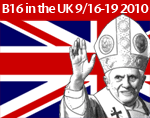
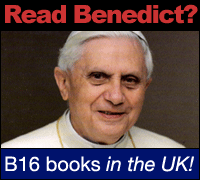
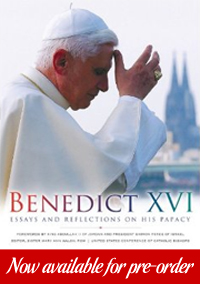


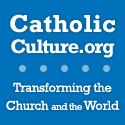
No comments:
Post a Comment